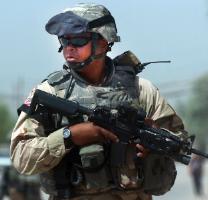The Israeli experience in Lebanon in the summer of 2006 should warn Americans against having an Army that has become so focused on irregular and counterinsurgency warfare that it can no longer fight large battles against a conventional enemy. In an important essay in the Journal of Strategic Studies, Israeli scholar Avi Kober recently noted that years of policing by the Israeli Army in its territories had degraded its ability to fight the Hezbollah enemy that used conventional tactics. The result was a significant battlefield defeat for the Israeli Army.
The American Army is in a similar condition today, and we should be worried.
A misleading current narrative contends that the recent lowering of violence in Iraq is primarily due to the American "surge" and the application of so-called "new" counterinsurgency methods. Because these new counterinsurgency methods have worked in Iraq, the thinking goes, why not try them in other places, such as Afghanistan? This hyper-emphasis on counterinsurgency puts the American Army in a perilous condition. Its ability to fight wars consisting of head-on battles using tanks and mechanized infantry is in danger of atrophy.

